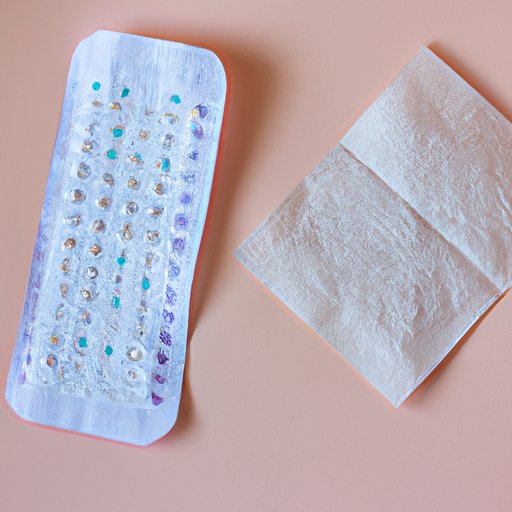
Introduction
The birth control patch is a contraceptive method that uses a combination of hormones (estrogen and progestin) to prevent pregnancy. It’s applied directly to the skin, usually on the abdomen, buttocks, upper arm, or torso, once a week for three weeks, followed by a patch-free week. Like many hormonal birth control methods, weight gain is a common concern for patch users. However, it’s important to separate fact from fiction when it comes to the relationship between the patch and weight gain.
The Relationship Between Birth Control Patch and Weight Gain
The birth control patch works by releasing hormones into the bloodstream that prevent ovulation (the release of an egg from the ovaries). By altering hormonal levels, the patch may impact weight regulation mechanisms in the body. Studies exploring the relationship between the patch and weight gain have produced mixed results. Some show that patch users are more likely to experience weight gain than non-users, while others show no significant difference in weight between the two groups. Overall, the impact of the patch on weight gain seems to be small, with most users experiencing a weight gain of 1-2 kilograms (2-4 pounds) in the first year of use.
However, there are several possible explanations for weight gain in patch users. For example, increased appetite or changes in food preferences may result from the hormonal changes caused by the patch. Water retention is another factor that can contribute to weight fluctuations. Additionally, for some individuals, the patch may alter metabolic functions leading to weight gain.
Debunking Myths Surrounding the Birth Control Patch and Weight Gain
Misunderstandings and stigmas surrounding birth control methods, in general, have led to several myths about the birth control patch and weight gain. For instance, some people believe that all hormonal birth control methods cause weight gain but that is not true. Additionally, it is a myth that the patch is most likely to cause weight gain. Comparatively, hormonal IUDs, oral contraceptives, implants, injectables, and vaginal rings all have a similar potential for causing weight changes as the patch.

Personal Experience with the Birth Control Patch
While scientific studies and data are essential, personal experience can provide valuable insights into the relationship between the birth control patch and weight gain. The author of this article has used the patch and noticed fluctuations in her weight. She shares her personal experience and advises patch users to prioritize a healthy lifestyle through a balanced diet, regular exercise, and incorporating positive habits to reduce the likelihood of weight gain.
Managing Weight While Using the Birth Control Patch
Using the patch does not mean that weight gain is inevitable. There are several tips and strategies that can help manage weight while using the patch. One way to maintain a healthy weight is to pay attention to your diet. Incorporating fruits and vegetables and reducing unhealthy fats will help keep your weight in check. Regular exercise or an active lifestyle can also mitigate the impact of the patch on weight gain. Finding and using a form of exercise that brings you joy can lessen the burden of exercise and motivate you to keep going. Lastly, there is no substitute for consistency. Developing a routine and sticking to it, while allowing yourself flexibility, is another important tactic for managing weight gain while using the patch.
Science behind the Birth Control Patch and Hormonal Imbalances
While the science is still being studied, hormonal imbalances and disruptions are believed to contribute to weight gain. It’s important to understand that hormonal imbalances are not always just a problem for patch users. Other factors that can impact hormonal imbalances, such as lifestyle, age, and body mass index (BMI), should also be considered. A medical professional should be consulted if you feel that hormonal imbalances are causing significant weight changes or other related symptoms.
Dissecting the Birth Control Patch Brand and Composition
The effectiveness of the patch relies on the composition of the hormones within the patch. Research is ongoing, but different patch brands and compositions may result in differing levels of weight gain. The age of the user and their BMI can also have an impact on the relationship between the patch and weight gain. It is important to consult with a healthcare provider on what the best patch option is for you.
Contraception Alternatives to Consider
For those who find that weight regulation is a significant concern, alternative contraception methods may be worth investigating. Several options like non-hormonal IUDs, condoms, diaphragms, hormonal and non-hormonal methods of birth control are available that have different side effects and potential for weight gain. Discussing the options with a healthcare provider is the best way to reach a decision on the best contraception method.
Conclusion
Weight gain is a potential side effect of the birth control patch, but it’s not inevitable. Managing diet and exercise while on the patch can mitigate this potential issue. The patch’s impact on hormonal balance has also been debated, so it’s important to speak with a health professional to ensure that any hormonal imbalances are managed appropriately. Debunking the myths and stigma surrounding the birth control patch and weight gain can help move beyond misinformed ideas and make informed decisions about contraception methods. Regardless of your choice of birth control, a healthy lifestyle and regular check-ups with your healthcare team will help you achieve your goals while staying healthy and safe.





